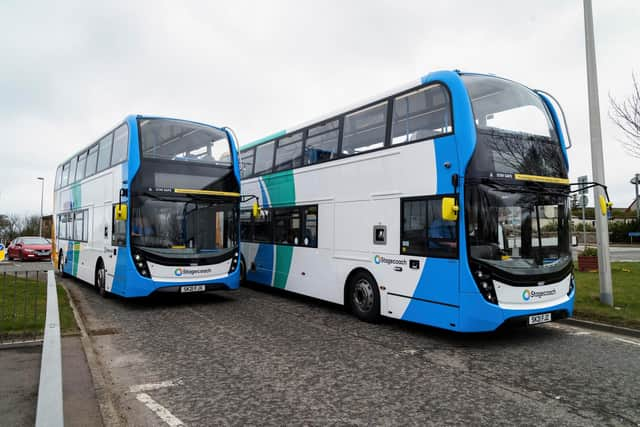Stagecoach journey takes dramatic twist after 40 years as Scottish bus operator enters mega-merger talks
The Perth-headquartered bus operator, which was founded in 1980 by Sir Brian Souter and his sister Dame Ann Gloag, confirmed that it was in discussions with National Express over a potential all-share merger.
Under the proposed terms of the tie-up, National Express would own around 75 per cent of the combined group and Stagecoach shareholders the remaining 25 per cent. The deal would value the Scottish firm at some £445 million.
Advertisement
Hide AdAdvertisement
Hide AdIn a statement to the stock market, Stagecoach said that both boards believe that the potential tie-up would be a “strategically compelling proposition” with the potential for “significant growth and cost synergies”.


A combined group would see National Express utilising Stagecoach's “well-located depot network” to run and maintain its coach operations.
Any merger would also bring the “best of both” from the combined operational capabilities of both businesses, while delivering “significant benefits” to customers and passengers.
If the talks lead to a deal, the combined group would see Stagecoach chairman Ray O'Toole become chairman of the board.
National Express boss Ignacio Garat would be chief executive of the enlarged group.
In June, analysts said Stagecoach was sitting at “a fork in the road” as bosses revealed that annual revenues and profits had been hit hard by the pandemic.
While the group remained in the black with an adjusted pre-tax profit of £17m for the year to May 1, that was well down on the £90.9m generated a year earlier – a period that was largely unaffected by the coronavirus crisis. Full-year revenues reversed to £928.2m from more than £1.4 billion in 2020.
The firm noted that patronage and commercial revenues were on an “improving path”, underpinned by “supportive” government measures in Scotland, England and Wales.
Advertisement
Hide AdAdvertisement
Hide AdThe group said a new long-term sustainability strategy had been finalised, with a zero emissions UK bus fleet targeted by 2035.
Ben Nuttall, senior analyst at Third Bridge, said the transport operator was sitting at a fork in the road.
“Stagecoach is now beholden to a new set of circumstances beyond their control such as public confidence, hybrid working patterns and the vaccine rollout,” he noted.
National Express has bus and coach networks across the UK and Spain, while it also runs school bus services in America and a rail franchise in Germany. But Stagecoach is UK focused and is Britain's biggest bus and coach operator.
The talks come after National Express rejected a £1.7bn merger deal first mooted by Stagecoach in 2009.
This former attempt at a merger between the two would have seen Stagecoach own the majority of the combined group, with National Express left with up to 40 per cent.
In the latest move, the two firms stressed that talks were ongoing and that there was no certainty a formal offer will be made.
National Express has until 5pm on October 19 to make a firm offer or walk away, under City Takeover Panel rules.
Advertisement
Hide AdAdvertisement
Hide AdSusannah Streeter, senior investment and markets analyst, Hargreaves Lansdown, noted: “Consolidation in the hard hit travel sector has been expected and it appears the bus coach and rail business is ripe for restructure.”
Stagecoach shares leapt by about a fifth.
A message from the Editor:
Thank you for reading this article. We’re more reliant on your support than ever as the shift in consumer habits brought about by coronavirus impacts our advertisers. If you haven’t already, please consider supporting our trusted, fact-checked journalism by taking out a digital subscription: www.scotsman.com/subscriptions
Comments
Want to join the conversation? Please or to comment on this article.
